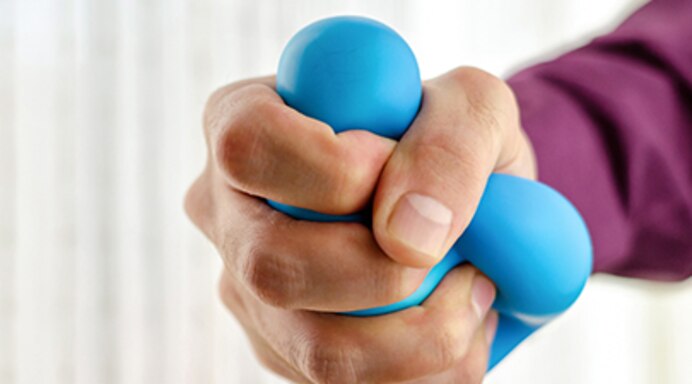Our Jewish calendar is overflowing with Shabbos and holidays, simchas, and mitzvos. We cease old projects, ramp up for the new Jewish occasion, prepare, enjoy, then wind down and transition back to everyday life. We are balancing this together with the demands of a modern world. Technology has its advantages but it comes with a demand of emails and texts to return, many to dos and projects to accomplish. Therefore, we should all be looking to juggle these time-bound holidays and everyday responsibilities successfully. Our goal in being an Eved Hashem and a light to the nations is to have a healthy neshama and guf.
But many of you may think, I do handle this all without stress! I would like you to look deeper. Stress can be handled silently; some of us hold stress in our body and hide it while others show it with emotion. The reason to address and manage stress is that it has the ability to cause physical repercussions. For example, chronic stress causes membranes of our gastrointestinal tract to become permeable (“leaky gut”) which leads to conditions associated with IBS, autoimmunity, allergies or sensitiveness to certain foods. Stress causes inflammation, which negatively impacts the brain/mental health, heart health, and difficulty losing weight (especially around the midsection).
Stress benefits us in certain ways as well. Short-term stress is when our body is in fight or flight (sympathetic) mode and can save our life when we need to run from an animal. In Jewish history, it has helped us flee from danger and in general, stress can help us get things done. While short bursts of stress are ok, we don’t want to stay in this mode for long. During this short-term stress, our body becomes temporarily insulin resistant so that we don’t store sugar away in muscle, it stays in the bloodstream to be used when needed to run away from danger. Also, our body’s resources and blood supply are directed away from digestion and are on alert for survival for the moment. Inflammatory molecules rush to the scene waiting to help fix whatever needs fixing after our “battle”. All of these responses are very helpful in the short term but are harmful if it becomes chronic.
Short-term stress can become chronic because of deadlines, checking emails and the news, and trying to meet the demand of Jewish life and time-bound holidays or mitzvahs. Our body thinks it’s running from an animal, when in fact we may be sitting in a chair checking an email, or worrying will we have enough food for the entire chag, will a certain guest be happy with our menu, did we learn enough before Yom Tov? Cortisol, our stress hormone, is measurable and extremely high in our generation. When short-term tress becomes chronic then insulin resistance persists, inflammation and blood sugar stay high, and many people experience digestive issues because their gut and digestion are ignored.
In fact, research shows the majority of our day is spent in the sympathetic mode, when our bodies are only wired to be in this mode for ten minutes a day. Hashem designed our guf to operate best in parasympathetic mode, known as the rest, relax, digest, heal mode. A person can manage to be in parasympathetic mode while still being busy; it just takes awareness and practice. Many of us think we are relaxed or laid back, while our cortisol levels are high. My wife, Tatum, and I had a big wake up call that made us realize we are more stressed than we thought.
Toward the beginning of our marriage, when our first baby was born I woke up all of a sudden with stomach pains that would not ease up. This low-grade constant stomach pain led me on a journey to discover why this occurred (when doctors had no answer) and how to fix it. At the root cause was stress, and for it to heal has taken many years of implementing dietary changes and learning how to operate in the parasympathetic mode, which allowed my gut lining to heal.
My wife is a dietitian and she worked with a functional medicine doctor to improve her health and learn more about the nutrition field. She took a test that would assess her gut microbiome (the ecosystem of our gut). It’s important to have a plethora of good bacteria living in our gut because this is where the majority of our immune system is and the gut bacteria send 70% of messages throughout our body. Tatum questioned the doctor as to why there were four species of good bacteria that showed no positive growth in her sample. He explained that the specific bacteria she was asking about do not grow in the presence of cortisol. So much for thinking we were laid-back unstressed people! Little did we realize chronic stress was impacting our physical body.
The Rabbis call our generation “Ikvsa d’Misheecha” (the Heel of Moshiach). We are on the “heels” of and are extremely close to the times of Moshiach. The essence of our generation is also like that of a “heel”. Just like a heel is tough, has rough skin, and very little feeling, so too people in our generation are tough, numb and not as connected to our feelings and emotions.
My Rosh Yeshiva, Rabbi Beryl Gershenfeld of Machon Yaakov Jerusalem, taught us the great Slabodka yeshiva tradition of how important it is for a person to recognize and focus on the special qualities possessed within. By developing and connecting to our own special personal qualities, we can each grow to be the person we are destined to be.
While being “the heel” and resilient is important, it’s difficult to work on middos and reach our potential if we are numb to emotion. In order to achieve the personal greatness that the Alter wanted for us, we must address and excel in our physical and mental health. We are emotional beings and have emotional relationships and we need to learn how to handle this. So, knowing that we are more numb than previous generations, it’s no surprise to me that most of us don’t even recognize or sense that we are stressed.
Perhaps the yetzer hara is even at work keeping us all too busy to think about how we feel and what can be improved. We may not hear whispers that we are stressed, which might feel like tightness in our chest, shortness of breath, tension in our necks, or a cramped stomach. For many, it takes more obvious symptoms like feeling depressed, needing to see cortisol levels on paper, or having stomach pain that we realize is not going away. Recognizing stress is the first step to combat the problem and live life in the parasympathetic mode, the way Hashem intended us to thrive.
Once we recognize stress the next step is to learn techniques to channel stress out of our bodies. Some techniques are literally a switch that turns off the sympathetic mode and changes a person to the parasympathetic mode, almost instantly. And lastly, don’t fight it. Stress is normal; take time to do the exercises and what’s recommended because it takes a lot of work to swim upstream in a stressful world.
One day, I came home from work in a nice mood and my wife was in the kitchen and she seemed on edge, stressed. In fact, it was erev chag and we were leaving town a few days later. She had cooking to finish, planning for guests to come over, and was dealing with the kids and packing. She had all the reasons in the world to be stressed and when I suggested she go to the couch to try a relaxation technique, deep breathing, that stressed her out even more. Who has time for taking a “break” when the clock is ticking? She gave in to my encouragement, went to the couch to focus on doing deep, diaphragm breathing. I sat next to her to make sure she was doing it correctly. After about 5 minutes of deep breathing, she sat up, felt tingling, and absolutely no stress or urgency about the situation. It was incredible to witness the improvement I saw in my wife. She couldn’t believe it herself; she was a different person and could continue to operate effectively in a non-stressed, parasympathetic mode.
Here are a few other therapeutic tools (in no particular order) that can help alleviate and manage stress day to day:
-
- Pay attention, stop, think and ask yourself over and over throughout your day: “Am I stressed right now?” We need to become aware of ourselves and whether or not we are actually stressed and if we can feel in it our body. This can then help us combat it.
- Meet with a therapist or another professional who can help guide you through your emotions and solutions. Sometimes things are just too difficult to overcome by ourselves.
- Work on your spirituality/connection to Hashem. Ask yourself how this part of your life is really going. Seek advice from your Rabbi if needed.
-
- Find time to talk/de-compress with your spouse, family member, Rabbi or Rebbitzin, or friend. Make an effort to do this even if it’s out of your comfort zone. This can help alleviate stress by being able to confide in others for support.
- Practice deep breathing. Diaphragm breathing is to breathe in through your nose into your belly rather than into your chest. You will feel your stomach expand like an umbrella or if you are lying down your chest will be frozen and your belly will expand. This is the technique that automatically puts you into parasympathetic mode. Try to breathe in for a 4 count, hold your breath for a 4 count, and exhale for a 4 count. (or try a 4,7,8 count)
- Move your body. This technique can be one of many different options. Whether it’s exercise, weight training, dancing, running, walking, swimming, there is no limit to the different ways to implement movement into our life. They are all beneficial in different ways.
- Practice Affirmations, Reframing, and Gratitude. For affirmations think of some area you are struggling with, and make the opposite your affirmation. (If you are always late to things you can try…”I thrive at being punctual always.”) Repeat it in the morning, afternoon, and night (or many times per day). Reframe the difficult things in your life by looking at the positive side of it. Express gratitude for everything you do have right now…
- Make time for self-care. Chesed for yourself! This is one that gets missed by all of us. Take time for yourself, no matter how busy, to do things that make you feel rejuvenated.
- Improve diet and lifestyle habits Eliminating processed foods, etc. while adding in certain whole real foods can help to alleviate stress
- Bathe yourself in nature. Strong research shows that exposure to nature can increase calmness…the parasympathetic mode.
- Try and limit technology as much as possible. Being a digital minimalist may help you to focus more on what’s important in life and will help you disconnect from the endless to-dos technology offers.
__________
Jeremy Stern LCSW is a clinical psychotherapist who has a private practice in Lincolnwood. IL. He sees children, adolescents, adults, and couples and in therapy uses techniques of psychoanalytic psychotherapy mixed with a holistic lens. Jeremy strives to help each patient achieve maximum healing and success. Feel free to call with questions or comments at 847-213-1046.







